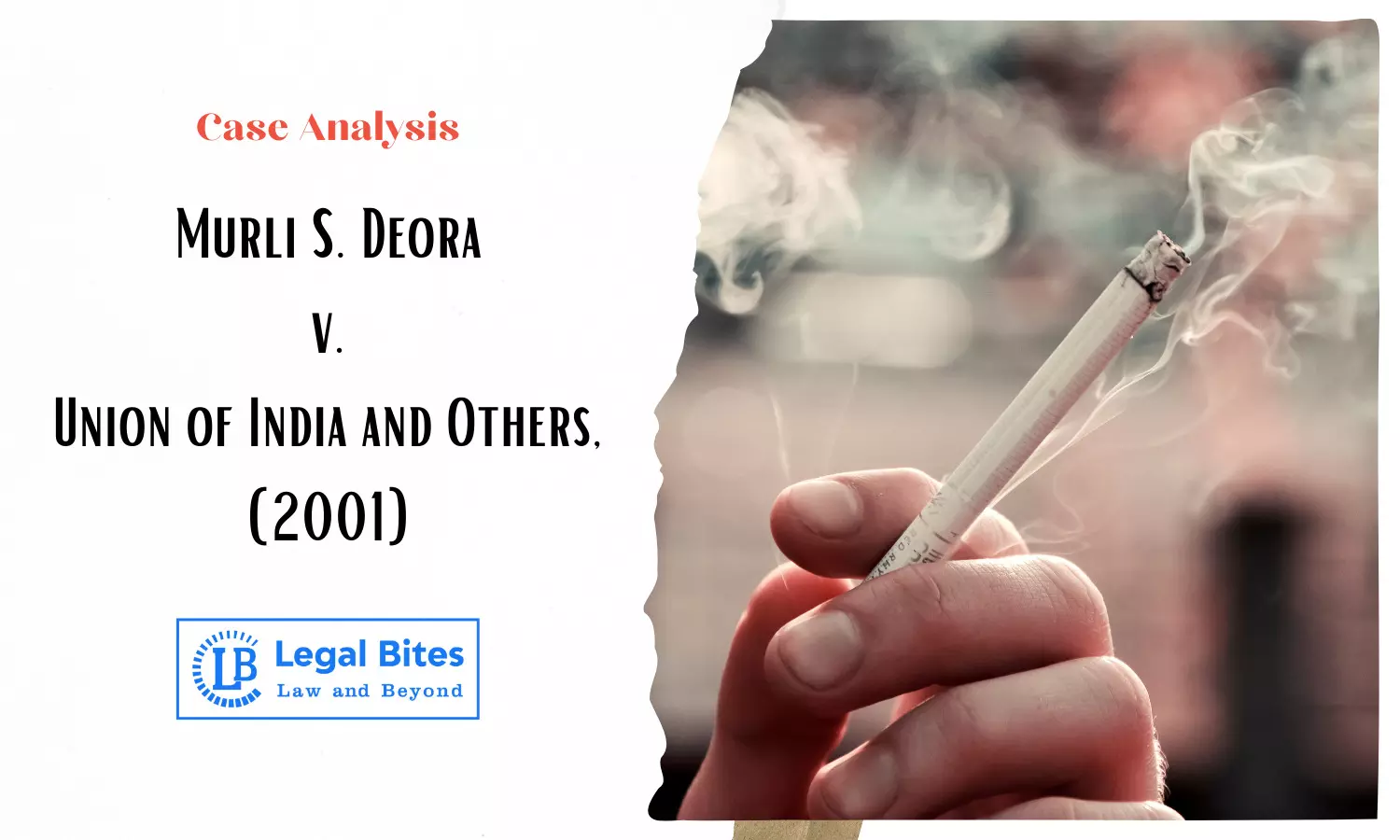Case Analysis: Murli S. Deora v. Union of India, (2001) | Health Hazards Linked to Cigarette Smoking
The case 'Murli S. Deora v. Union of India' was a landmark legal proceeding that exerted a considerable influence on the right to life of passive smokers.

The case 'Murli S. Deora v. Union of India (2001)' was a landmark legal proceeding that exerted a considerable influence on the right to life of passive smokers.
Case Title: Murli S. Deora v. Union of India and Others
Court: Supreme Court of India
Citation: Writ Petition (Civil) 316 of 1999
Judges: Justice M.B. Shah & Justice R.P. Sethi
Date of Judgment: 02/11/2001
Introduction
Exposure to cigarette smoke is harmful on many levels since it contains more than 6,400 chemicals. Of the said, nicotine is most frowned upon due to its high tendency to induce addiction, especially among teenagers and the youth. Cigarettes are also termed ‘cancer sticks’ over the ages because they are filled with carcinogenic substances that can lead to lung cancer, mouth cancer and a variety of cardiovascular diseases as well. This case is one in the Indian Judiciary, that aims to bring awareness of the same and prevent its ill effects from seeping into the lives of people who do not use the substance but are yet exposed to them outdoors, in public places.
Facts of the Case
The present case revolves around the act of public smoking and its observed ill effects on people of all ages and diversity. The petitioner in this case filed a Writ Petition before the Supreme Court of India under its Writ Jurisdiction (Article 32) as provided in the Indian Constitution on 31/08/2001. Previously, upon the Court seeking a response from the Central Government, w.r.t an order/affidavit being passed prohibiting public smoking, no such affidavit/order was passed and the Court thus was compelled to adjourn the matter. In the present proceeding of the matter as well, the required order did not flow from the Central Government.
However, the learned Attorney-General with all emphasis on his command submitted that an appropriate order banning smoking in public places be passed. Learned counsel for the petitioner also submitted to the aforesaid effect. Counsel appearing for other respondents also supported the same. It was observed by the Court that statutory provisions are also being drafted before a select committee for the State of Rajasthan and that in the Union Territory of Delhi as well - public smoking is prohibited.
The primary contentions raised was that non-smokers, which include women, children, senior citizens and every category of civilians, should not be exposed to the ill effects of passive smoke merely by choosing to go outdoors. The learned Attorney General and the Counsel for the Respondents as well, attested to such a submission, which is seen through Justice M.B Shah’s elaborate description of the plethora of diseases, supported by statistics, caused by cigarette smoke/fumes.
“The persons not indulging in smoking cannot be compelled to or subjected to passive smoking on account of the acts of the smokers.”
Realising the gravity of the situation, the Court in this case passed an order banning/prohibiting public smoking in the following areas -
(a) Auditoriums
(b) Hospital buildings
(c) Health institutions
(d) Educational institutions
(e) Libraries
(f) Court buildings
(g) Public offices
(h) Public conveyances, including railways
The learned Attorney General of India confirmed on behalf of the Union, that it would take the necessary effective steps to bring about the ordered changes in the judgment and ensure that the order as well as its intended effect in society attract large publicity and be accessible electronically as well.
The Court also requested the Registrar-General to intimate all the State Governments/Union Territories not having laws on the subject-matter, to incorporate some form of statutory provisions governing the said, of which, a compliance report containing such provisions - would have to be submitted before the Court.
Issue
- Is the act of smoking in public a violation of Article 21, which guarantees the Right to Life, for non-smokers subjected to passive cigarette smoke in public areas?
Laws Involved
- Article 21 of the Indian constitution
- Article 32 of the Indian Constitution
- Cigarettes (Regulation of Production, Supply and Distribution) Act, 1975
Analysis of the Case
Expanded Scope of Article 21
In the present case, the act of public smoking was primarily challenged in respect of Article 21 of the Indian Constitution. To safeguard the health of non-smokers, the Court observed that allowing smoking in public places would amount to an indirect violation of the right to life of non-smokers and thus sought to impose a blanket ban on public smoking, at least in the areas as mentioned by it, if not any and every form of public smoking. The said objective was also the primary purpose of the Cigarettes and Other Tobacco Products Bill of 2001, which aimed at reducing the direct contribution that public smoking has towards air pollution.
Through prior judicial decisions, it has also been rendered that the Right to a clean and safe environment is also an extended branch/arm of Article 21. The same may be related to the circumstance in the present case to depict how the act of public smoking hinders a clean, healthy and safe environment.
Power of the Judiciary to Bring About Executive Action
This case is also an accurate example of how Courts (SC and HCs) have the power to direct/give instructions to executive bodies if their action/inaction towards a particular matter results in the violation/infringement of the rights of individuals, which was the situation in the said matter. Thus, the Supreme Court of India held after evaluation of the matter, and passed directions to the Registrar-General of India, to intimate all State Governments and Governments of Union Territories to pass necessary enactments/provisions regarding public smoking, imposing a blanket ban on Act in the mentioned areas/amenities/facilities.
Conclusion
Public smoking has negative impacts on all categories of persons and is also harmful to the environment. The decision of the Court in this case advances societal and environmental needs, aiming to combat cigarette/tobacco use outdoors. It is through such devotion and effort of the Judiciary, to protect the rights of the people, that the scope and meaning of Article 21 are pervasive yet adaptable to either be inclusive of certain aspects or to exclude certain aspects, thereby furthering the needs of the people by protecting their rights. The case of Murli S. Deora v. Union of India underscores the malleability of Article 21. This is evident through the application of a broad interpretation when reading the article.

